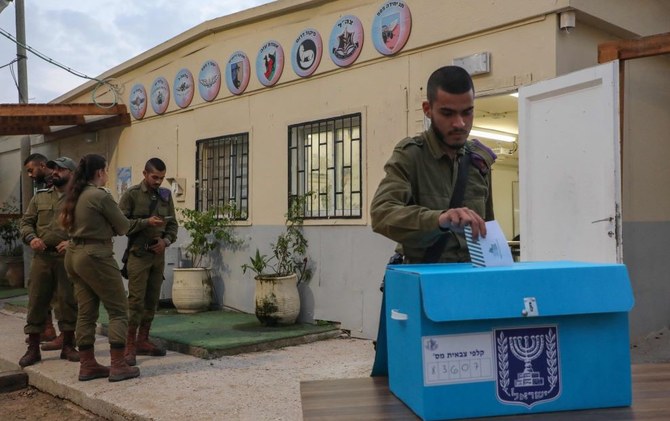RAMALLAH: Israeli security authorities oversaw a complete closure of West Bank and Gaza Strip crossings on the eve of parliamentary elections, fearing Palestinian armed attacks against Israeli targets during voting day, either inside Israel or in the West Bank.
All of the West Bank and Gaza Strip crossings with Israel will remain shut between midnight on Oct. 31 until midnight on Nov. 1 in view of Tuesday’s election.
More than 130,000 Palestinian workers will be unable to enter Israel, and the import and export of goods will be halted.
The Palestinian economy will suffer hundreds of thousands of dollars in losses because of the closure, Palestinian economic experts told Arab News.
Israel claimed that its intelligence services had received dozens of security reports that Palestinians were planning to carry out armed attacks in the West Bank and inside Israel, before and after the elections.
A surge in warnings over the past two days has raised fears among the Israeli military establishment about the possibility of attacks during election day.
The Israel Kan public TV channel reported that the Israeli intelligence services had received about 100 security warnings over the past few days concerning possible military attacks against Israeli Defense Forces targets and settlers in the West Bank
In response, the state of alert in Jerusalem was raised to the maximum level and Israeli military forces in Hebron were reinforced.
Israeli security services say that the rise in attacks and their extension from the north of the West Bank to the south — as happened on Oct. 29 in Hebron — has raised deep concerns.
On Sunday evening, Israeli Prime Minister Yair Lapid ordered the reinforcement of Israeli operative security forces in the Hebron area and the rest of the West Bank, beginning Sunday evening, and the continuation of high alert measures in all arenas, according to a statement by the PM’s office.
“We will act vigorously against the perpetrators of the attacks and their senders,” he said.
A senior Palestinian official who requested anonymity warned Arab News that armed attacks by Palestinians during the election period could result in vote swings toward right-wing figures such as Benjamin Netanyahu and Itamar Ben-Gvir.
Some 650,000 settlers living in the occupied West Bank are expected to vote in Tuesday’s elections, making up a powerful voting bloc.
A senior Israeli army officer warned that the army might arrest wanted Palestinians who decide to surrender to Palestinian security services.
“We will not accept the killers of the soldier near Nablus two weeks ago surrendering themselves to the Palestinian security services ... even if they surrender, we will know how they can be caught.”
He added that the Israeli army and Shin Bet were engaged in a manhunt to find the assailants and prevent another shooting.
It is feared that the Israeli officer’s threat might hinder the efforts of the Palestinian Authority and its security services, who have tried to persuade members of the armed group the Lions’ Den to surrender.
Five senior members of the group surrendered to Palestinian security services last week, fearing that they would continue to be pursued by the Israeli army or killed.
“The Israelis do not want the Palestinian security to succeed in handling the security situation and practicing its authority inside the Palestinian cities,” a senior security official from the Palestinian Authority told Arab News.
“Therefore, every time the Palestinian security manages to take control over security, the Israelis foil us either by their multi-incursions or provocative declarations.”






















